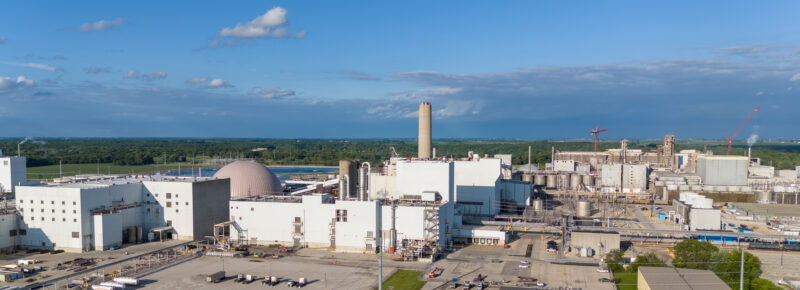
MAHOMET AQUIFER, Ill. – A recent leak at Archer Daniels Midland’s carbon capture and sequestration (CCS) facility underscores concerns for the safety of the Mahomet Aquifer, a critical drinking water source for nearly one million people across 14 counties in Central Illinois.
The leak, reported by E&E News to have occurred at ADM’s ethanol plant near Decatur, has raised fears about the long-term safety and viability of carbon storage in the region. ADM began sequestering CO2 on its site in 2011, and has injected and stored about 4.5 MMT CO2 over the past 13 years. The leak occurred about five miles outside of the Mahomet Aquifer.
This leak spotlights the risk to the Mahomet Aquifer if carbon sequestration is not banned through or under the aquifer.
This week, Sen. Paul Faraci (D-Champaign) and Rep. Carol Ammons (D-Urbana) introduced legislation that “would prohibit carbon sequestration activity over, under or through a sole-source aquifer.” The bills will be considered during the November veto session and HB5874 is already available on ilga.gov.
“This leak is a wake-up call. It’s a stark reminder that carbon capture is not the climate solution it’s sold as, but a dangerous gamble with our drinking water,” said Pam Richart, co-director of Eco-Justice Collaborative.
The Mahomet Aquifer was designated a sole source aquifer by the U.S. Environmental Protection Agency in 2015, meaning that contamination would create a significant public health hazard with no feasible alternative drinking water source available to the region.
“The proposals for storing CO2 under the Mahomet Aquifer and its recharge areas now under review by the U.S. EPA are over 50 times that already sequestered by ADM, and this could be just the beginning,” Richart said. “The Mahomet Aquifer, which sustains nearly a million people in Central Illinois, cannot afford to be put at risk by experimental technologies like carbon capture and storage. “
“We applaud Senator Faraci, Representative Ammons, Senator Rose and Representative Schweizer for taking action to protect the Mahomet Aquifer. This incident demonstrates why a ban is the only way we can be certain that the Mahomet Aquifer will be protected,” said Andrew Rehn, Director of Climate Policy at Prairie Rivers Network. “We need clean water forever, and to do that, we must take action now to protect the Mahomet Aquifer before it’s too late.”
The U.S. EPA is reviewing several carbon sequestration projects across Central Illinois. Three of the projects aim to inject carbon through the Mahomet Aquifer and store it underground, potentially exposing the water supply to contamination from carbonic acid and harmful heavy metals.
The push for a legislative ban aligns with growing public sentiment against CCS projects. A recent poll conducted by Embold Research found that 71% of Illinois registered voters oppose carbon sequestration under the Mahomet Aquifer, citing fears of water contamination and the unproven safety of the technology.
ADM has received more than $281 million in federal funding for carbon capture and storage projects since 2009, in addition to tens of millions of dollars in tax credits.
Earlier this year, Governor JB Pritzker signed Senate Bill 1289 to regulate carbon capture and storage in Illinois. The law requires corporations to provide an alternative drinking source if it becomes contaminated by a leak. But there is one critical gap that wasn’t addressed in the legislation — sole source aquifers like the Mahomet. The sole source designation means that there is no reasonably available alternative drinking water source for users of the Mahomet Aquifer. Therefore, no company would be able to provide an alternate source.
The Protect The Mahomet Aquifer campaign is urging citizens to contact their local legislators and demand that the proposed legislation to ban CCS projects under the aquifer be passed without delay.
About Protect the Mahomet Aquifer
The Protect The Mahomet Aquifer campaign is a coalition of community members, environmental organizations, and advocacy groups united to protect the Mahomet Aquifer — a vital water source for nearly one million people across 14 counties in Central Illinois. In response to the growing threat of carbon capture and sequestration (CCS) projects proposed under the aquifer and its recharge areas, residents have mobilized to demand action.
The campaign, led by Eco-Justice Collaborative, Illinois People’s Action, Prairie Rivers Network, and concerned citizens, is calling for a legislative ban on CCS projects that risk contaminating this critical water source. We believe that safeguarding the Mahomet Aquifer from the dangers of CCS is essential to preserving the health and well-being of our communities, environment, and future generations. Together, we are committed to protecting our water, our land, and our shared future.







